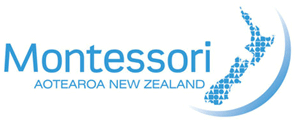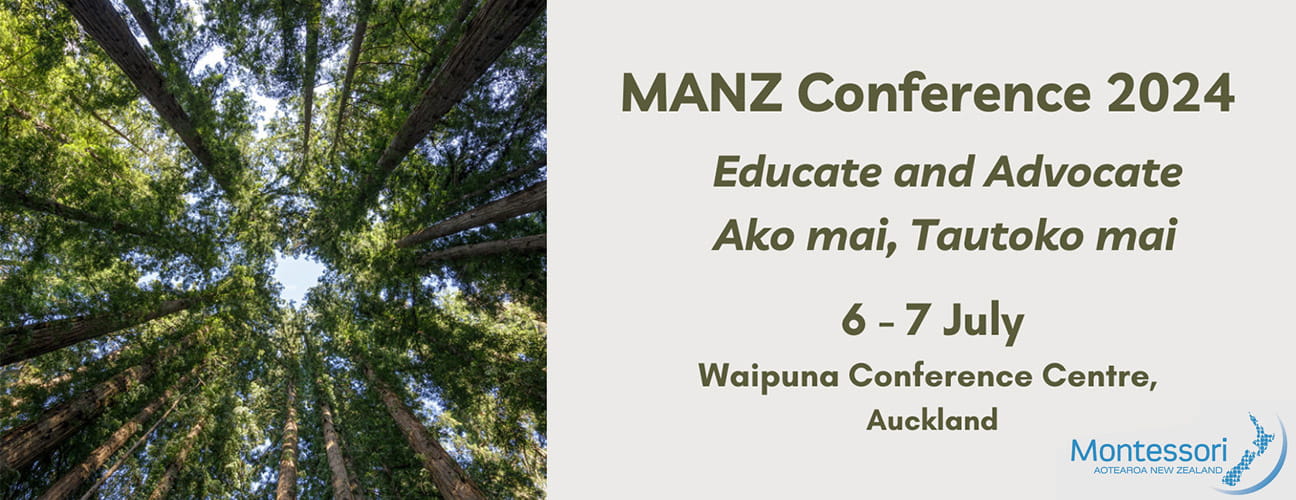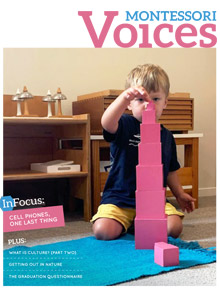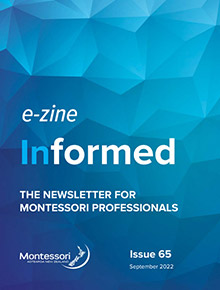Montessori, an education for the future
2007 was the centenary of the international Montessori movement. In New Zealand, Montessori educators shared their views of why Montessori is the education for the future.
Montessori, a source of sanity and balance
Montessori education in Aotearoa, New Zealand, will emerge as a source of sanity and balance at a time when our state education system is fast becoming product orientated and market-driven, reflecting a machine and screen world where digital technology reigns. Our Montessori early learning centres and schools are places where time slows down, with strong connections to people and places that are protected and celebrated. Digital technology will be just one of the many resources we will use. The content of our lessons will promote mindful responses to human questions and enable children to make wise and creative choices about real life lived in the community.
Our Montessori communities will be guided by clear, simple human values that empower our children to become strong individuals who embrace diversity and interact with each other and the environment with respect and responsibility. The future of our planet needs children who garden, dream, and whose lives and learning are connected to our human reality. In a time of distraction and excess, Montessori education will provide us with a way back to what is essential and sufficient.
Pauline Harter, Wairarapa Montessori Centre and Montessori at Southend School, New Zealand
Montessori is not about buildings or pieces of man-made materials; it’s about assisting the development of the human spirit
Maria Montessori had always hoped the Montessori system would become a ‘state’ educational system. However, each time the wheels began to turn, something happened. In the United States, she went head to head with John Dewey and his school of philosophy (the progressives); in Spain, Franco came to power; in Holland, Hitler invaded; in Italy, Mussolini burned equipment and materials. Perhaps, as Montessorians look for state funding in the future, they will remember these lessons and consider that Montessori is not about buildings or pieces of man-made materials; it’s about assisting the development of the human spirit. Anne Frank proved that.
Mary Russo, Auckland University of Technology, New Zealand
Montessorians have a gem in their understanding of this simple yet profound philosophy of education
Increasingly, I hear dismay from parents either at the lassez faire approach to education or the rigidity of adult-led programmes. Neither do much to nurture children’s innate potential. Montessorians have a gem in their understanding of this simple yet profound philosophy of education or – as I see it now – as a unique approach to human development. But like many precious gems, they are rare! Therefore, I see two things for the Montessori movement to focus on for the future. We need many more Montessori-prepared environments for babies through to adolescents. To fulfil that need, we must have many more adults with a coherent understanding of Montessori principles to create those environments. Let us actively recruit by introducing the philosophy that underpins the Montessori method to parents, students, colleges of education, and those who genuinely believe that children deserve more than is currently being served!
Carol Potts, Auckland, New Zealand
My dream for Montessori in New Zealand is that it will be a well-respected and understood educational system
My dream for Montessori in New Zealand is that it will be a well-respected and understood educational system, where many students, especially young men, were training in venues throughout the country, where there was a choice of education for our children all the way through to their college years.
How can we get there? Spread the word, and encourage early childhood and primary teachers to come into our centres to share ideas. Montessori has so much to offer, especially to the children who are struggling and falling behind. Face-to-face training of a very high standard needs to become available here in New Zealand, and let’s encourage young men to come back into teaching roles, where they have so much to offer.
Tia Wooller, Totara Hill Montessori, Matakana, North Auckland, New Zealand
Science now conclusively proves Montessori’s developmental theory and the accuracy of Montessori educational practices in the ways people learn
New Zealand Montessori will continue to grow in size due to demand. As it grows, so will its influence on how education is practiced throughout the rest of this country’s education sector. We have won the theoretical argument. Science now conclusively proves Montessori’s developmental theory and the accuracy of Montessori educational practices in the ways people learn. The newly released draft New Zealand curriculum, with its focus on producing “confident, connected, actively involved lifelong learners” and promoting self-managed, critical thinkers, is now unwittingly, I believe, more suited to Montessori classes than classes in current state schools. I believe the next decade will see us influence the way education is practiced. The state sector is likely to see the widespread end-of-school day ‘periods’ of whole-class learning and see more involvement of students in their assessment and planning of their learning. Short of formal adoption of the Montessori method, it is doubtful that the state sector or anyone in it will manage to implement our concepts and practices fully. Therefore, our growth and strength will depend on Montessori schools maintaining their authenticity to remain relevant and exceptional in their study and application of the Montessori approach and be there for others to follow.
Sola Freeman, Montessori parent, Wellington, New Zealand
The future of Montessori is in their hands
Based on the core of Montessori principles, the Montessori community has a responsibility to continue providing environments that allow children to use their hands. When a child asks, ”Can I see that?” of an object, they want to hold it and make contact with it. The entire environment is tactile. It is made that way because we know how important it is for children to learn multi-sensorial. In providing a solid foundation for children to learn this way, we acknowledge the tenants that Maria Montessori observed 100 years ago. Humans have not changed their learning patterns just because societies and technology have changed. While technology can facilitate learning, it does not change the nature of learning. Do you grasp this? This is the gist of understanding Montessori.
Maree Orland, Casa dei Bambini Montessori Foundation School, Christchurch, New Zealand
The role of Montessori education is to raise peaceful, self-motivated, capable students who will provide strong leadership
The role of Montessori education is to raise peaceful, self-motivated, capable students who will provide strong leadership wherever they may be. These future leaders can then influence decision-making at many different levels throughout our community and thus bring about a positive influence within society.
The role of the Montessori movement in New Zealand is to be seen as a viable educational option for all New Zealand children, not just those who can afford it. It should also support raising leaders of influence who embrace peacefulness as achievable throughout the world.
Rose Phillips, Eastern Suburbs Montessori Primary School, Auckland, New Zealand
It is time to help others see what we all know to be true, that children of all ages, stages and abilities flourish under this system of education
Montessori has spent the last many years in New Zealand, getting a toehold in both the early childhood and primary sector. At times it has seemed precarious, and there are cases when it still seems we are fighting to be heard and recognised, but I think we are accepted now by the officials as something that will not go away. Now we are this far; it is time to help others see what we all know to be true – that children of all ages, stages and abilities flourish under this education system. In our multicultural society where some children are failing and others are opting out of education far too early, and where people are looking for an answer to these and other issues relating to education and children, we need to let them know that the answer is here and, great results are more than possible, that we do not need to keep reinventing the wheel.
Jan Gaffney, Principal, Wā Ora Montessori School, New Zealand
The power of what we can achieve is staggering
I think Montessori education (in NZ, in particular) is at a turning point. It is starting to grow and expand into other age groups but is still very vulnerable. So how we move forward now will hugely impact the strength and acceptance of Montessori as a possible alternative to traditional education methods.
There is now research validating Montessori education as a viable alternative. We have a number of challenges, however, that may and have already led to the watering down of Montessori in its truest sense. Some changes are necessary and good. We must constantly be willing to listen and learn from new developments and research in science and technology. We must, however, fight against compromising what we know is not in the children’s best interests and how Montessori is delivered.
The power of what we can achieve is staggering. Yet, right now, a small proportion of this generation across the globe has grown up in a society that encouraged them to think for themselves, consider others and find their role in the cosmos. These children are our potential leaders of tomorrow.
Gillian Somers Principal, New Plymouth Montessori School, New Plymouth, New Zealand
The way forward seems clear, Montessori’s role in the future is to be heard as a Children’s Advocate
Within Montessori education, we have, at our fingertips, the sensitive language to describe the stages children pass through as they grow. Montessori theory and practice are frequently validated by researchers studying child development and learning. Whether the latest buzz words are multiple intelligences, learning styles, flow theory, or right brain/left brain thinking, the Montessori model is a close and compatible fit.
As Montessori educators, we are well equipped to speak loudly and clearly on any child-related subject, not just in our schools, our parent community, and the wider public arena. As a profession that serves children, we need to be heard more often. Did we misplace the Montessori submission in the recent debate about “smacking”? Who heard our perspective on the amendment to Section 59 of the Crimes Act? When our politicians proposed that the age for “criminal responsibility” be lowered to make 10-year-olds accountable, we missed an opportunity to demonstrate outrage, to share wisdom, and to caution law-makers by declaring: “Slow down…because we know about this stuff, 10 is coming up to 12, these are poignant ages…please listen!”
The way forward seems clear. Montessori’s role in the future is to be heard as a Children’s Advocate.
Tania Gaffney, Richard Goodyear at Wā Ora Montessori School, Wellington, New Zealand and Dimitra Pantazis, Montessori at Berhampore School, Wellington, New Zealand
Our enthusiasm for Montessori must be inspirational and contagious and bring changes to parenting, teacher training, and community responsibility
From those early beginnings in the slums of Rome, Montessori education has spread throughout the world. Montessori herself said, though, that she did not invent a method of education – “I studied the child, and I have taken what the child has given me ….”
Herein lies the future … to go back to the roots and scientifically examine the needs of children. Adults can only transform children’s lives and educate them for a New World when Montessori’s philosophy is fully understood. Our love and respect for children demonstrate our principles and practices through applying this knowledge and our conduct. Our enthusiasm for Montessori must be inspirational and contagious and bring changes to parenting, teacher training, and community responsibility.
“Our care of the child should be governed, not by the desire ‘to make him learn things’, but by the endeavour always to keep burning within him that light which is called intelligence. If to this end we must consecrate ourselves … it will be a work worthy of so great a result.” [Advanced Montessori Method, 1917]
Beth Alcorn, Montessori World Educational Institute, Australia







